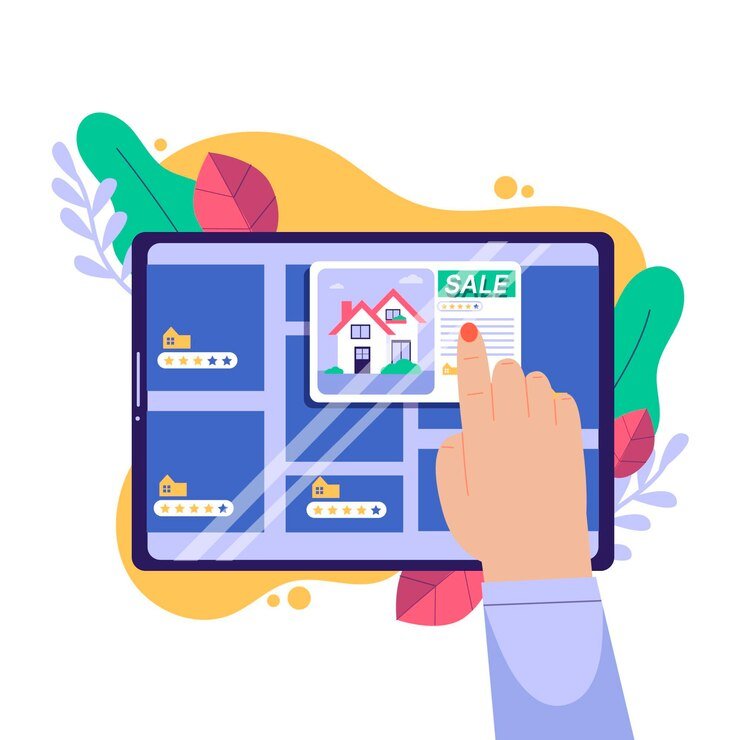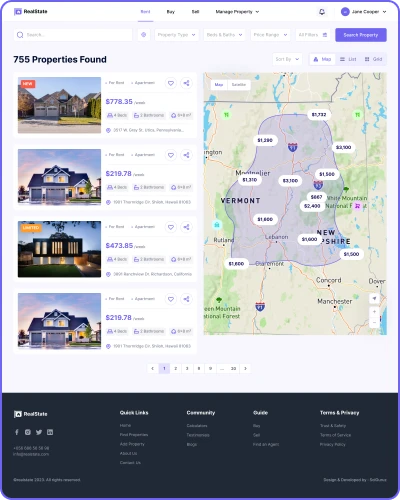Introduction to Real Estate Web Applications
The real estate industry, traditionally reliant on physical interactions and manual processes, is undergoing a significant transformation driven by technology. Real estate web applications are playing a crucial role in this evolution, streamlining processes, enhancing user experience, and fostering a more efficient and accessible marketplace for both buyers and sellers.
- The Role of Web Applications in Real Estate
Real estate web applications encompass a diverse range of online platforms that cater to various aspects of the industry, including:
- Property listings and search: Users can browse extensive databases of properties, filter listings based on specific criteria, and access detailed information about available properties, including photos, descriptions, and virtual tours.
- Lead generation and management: Agents and agencies can leverage web applications to capture leads, manage communication with potential clients, and streamline the sales process.
- Market research and analysis: Applications provide access to market data, trends, and analytics, empowering informed decision-making for both buyers and sellers.
- Communication and collaboration: Platforms facilitate communication between relevant parties involved in a transaction, such as buyers, sellers, agents, and lenders, fostering a smoother and more efficient collaboration.
- Marketing and advertising: Real estate professionals can utilize web applications to showcase their listings, reach a wider audience, and implement targeted marketing campaigns.
- Importance of Leveraging Technology for Property Transactions
In today’s fast-paced world, technology has become an indispensable asset in the real estate industry. Here’s why leveraging web applications offers significant advantages:
For Buyers:
- Increased efficiency: Search for properties from anywhere, anytime, and refine searches based on specific needs and preferences.
- Enhanced access to information: Gain comprehensive details about properties, explore virtual tours, and access relevant market data.
- Improved communication: Connect directly with agents and sellers through the platform, facilitating efficient communication and inquiries.
For Sellers:
- Wider reach: Market properties to a broader audience of potential buyers through online exposure.
- Streamlined lead management: Manage inquiries and leads effectively, and connect with potential buyers more efficiently.
- Data-driven decision-making: Utilize market data and analytics to set competitive pricing strategies and make informed decisions.
For Real Estate Professionals:
- Increased productivity: Manage workflows, automate tasks, and improve overall efficiency.
- Enhanced communication and collaboration: Connect seamlessly with clients, other agents, and involved parties.
- Improved marketing and branding: Utilize targeted marketing tools and showcase expertise through online platforms.
Overall, real estate web applications offer a win-win situation for all stakeholders involved in the industry, contributing to:
- Increased transparency and accessibility of information.
- Enhanced communication and collaboration throughout the transaction process.
- Improved efficiency and productivity for all parties involved.
By embracing technology and utilizing the power of real estate web applications, the industry can continue to evolve towards a more efficient, transparent, and user-friendly experience for everyone.

Benefits of Real Estate Web Applications
Real estate web applications offer a multitude of benefits for both individuals seeking properties and professionals within the industry. This section delves into two key benefits: enhanced property search experience and efficient property management.
Enhanced Property Search Experience
Finding the ideal property can be a time-consuming and overwhelming task. Real estate web applications address this challenge by providing users with a more streamlined and personalized search experience, empowering them to find their dream home or investment opportunity more efficiently.
- Utilizing Advanced Search Filters for Refined Property Searches
Gone are the days of sifting through endless listings. Real estate web applications empower users with advanced search functionalities:
- Detailed filter options: Users can filter listings based on various criteria, including location, price range, property type (single-family home, apartment, condo, etc.), number of bedrooms and bathrooms, square footage, amenities (pool, garage, etc.), and even pet-friendliness.
- Interactive map search: Visualize available properties on a map, allowing users to explore options within a specific geographic area and gain a better understanding of the neighborhood and surrounding amenities.
- Keyword search: Search for specific features or keywords within listings, such as “granite countertops” or “finished basement,” helping users pinpoint properties that align with their unique needs and preferences.
These advanced search features enable users to quickly narrow down their options and focus on properties that truly meet their search criteria, saving them valuable time and frustration.
- Providing Users with a Seamless and Intuitive Interface
A user-friendly and intuitive interface is crucial for a positive search experience. Real estate web applications are designed to:
- Offer a clear and organized layout: The interface should be easy to navigate, with readily accessible search options and well-presented property information.
- Utilize high-quality visuals: Engaging photos, virtual tours, and interactive 3D walkthroughs provide users with a comprehensive view of the property, allowing them to virtually experience the space before scheduling an in-person visit.
- Integrate user reviews and ratings: Real user reviews and ratings offer valuable insights into the property and its surroundings, helping potential buyers make informed decisions.
By prioritizing a user-friendly design, real estate web applications empower individuals to conduct their property search with ease, confidence, and a sense of control.
Efficient Property Management
Real estate professionals can leverage web applications to streamline their workflows and manage their properties more effectively. These applications offer functionalities that:
- Streamlining Property Listings and Updates
- Centralized listing management: Create, update, and manage property listings from a single platform, eliminating the need for manual data entry and ensuring consistency across different channels.
- Automated listing syndication: Publish listings to various online platforms and real estate websites simultaneously, maximizing exposure and reaching a wider audience of potential buyers.
- Real-time inventory tracking: Track the status of each property, from listing to closing, and maintain an accurate overview of available and sold properties.
These functionalities save property managers and agents valuable time and effort, allowing them to focus on building relationships with clients and closing deals.
- Automating Tasks like Document Management and Communication
Real estate transactions involve a substantial amount of paperwork and communication. Web applications can automate various tasks, including:
- Document storage and management: Securely store essential documents like contracts, leases, and applications within the platform, facilitating easy access and retrieval for all authorized parties.
- Automated communication workflows: Send automated emails and notifications to clients regarding property updates, appointment reminders, or application statuses, streamlining communication and reducing manual workload.
- Online scheduling and appointment management: Allow potential tenants or buyers to schedule appointments directly through the platform, offering convenience and eliminating the need for back-and-forth communication.
By automating routine tasks, real estate web applications free up valuable time for professionals, allowing them to focus on more strategic aspects of their work and delivering exceptional service to their clients.
In conclusion, real estate web applications offer a multitude of benefits that enhance the overall experience for both individuals seeking properties and professionals within the industry. From facilitating efficient property searches to streamlining property management, these innovative tools are shaping the future of the real estate landscape by promoting transparency, efficiency, and user satisfaction.
Key Features of a Robust Real Estate Web Application

To thrive in the competitive real estate market, a web application needs to offer features that cater to the evolving needs of both users and professionals. This section explores three key features that contribute to a robust and successful real estate web application:
User-Friendly Property Listings
Compelling and informative property listings are crucial for attracting potential buyers or tenants. Here’s how to achieve a user-friendly experience:
- Importance of Clear Property Descriptions and High-Quality Images:
- Detailed descriptions: Provide accurate and comprehensive information about each property, including square footage, number of bedrooms and bathrooms, key features and amenities, and any unique selling points.
- High-quality visuals: Utilize professional-looking photos that showcase the property’s best aspects. Consider including multiple photos from different angles and highlighting key features like the living space, kitchen, and outdoor areas.
- Integration of Virtual Tours and 3D Property Views:
- Virtual tours: Offer interactive 360° virtual tours that allow users to virtually explore the property from the comfort of their own homes.
- 3D property views: Provide users with the ability to virtually walk through the property in 3D, offering a realistic sense of space and layout.
These features significantly enhance user engagement, allowing potential buyers or tenants to gain a comprehensive understanding of the property without requiring an in-person visit.
Interactive Maps and Neighborhood Insights
Location plays a crucial role in real estate decisions. Real estate web applications can enhance the user experience by:
- Implementing Map Features for Location Analysis:
- Interactive map integration: Allow users to view property listings on a map, facilitating location analysis and comparison.
- Search by radius: Enable users to search for properties within a specific radius of their desired location, such as their workplace or preferred school district.
- Route planning and commute estimates: Integrate with mapping services to provide users with estimated commute times and route planning options.
These functionalities empower users to make informed decisions based on their individual needs and preferences regarding location and accessibility.
- Providing Insights into Neighborhood Amenities and Demographics:
- Neighborhood information: Offer users access to information about the surrounding neighborhood, including schools, parks, restaurants, shopping centers, and other amenities.
- Demographic data: Integrate relevant demographic data such as median household income, age distribution, and crime rates, providing users with a more comprehensive picture of the neighborhood and its suitability for their needs.
By offering these insights, real estate web applications can act as valuable resources for users, helping them make informed decisions beyond just the property itself.
Secure and Seamless Transactions
Security and trust are paramount when dealing with financial transactions in the real estate industry. Here’s how real estate web applications can ensure smooth and secure transactions:
- Integration of Secure Payment Gateways:
- Partner with reputable and secure payment gateways to facilitate online payments for rent, deposits, or other relevant fees.
- Ensure compliance with industry security standards and regulations to protect user financial data.
- Ensuring Data Privacy and Encryption for Financial Transactions:
- Implement robust security measures such as data encryption and two-factor authentication to safeguard user information and financial transactions.
- Maintain a clear and transparent privacy policy that outlines how user data is collected, stored, and used.
By prioritizing security and data privacy, real estate web applications can foster trust and confidence among users, encouraging them to conduct transactions through the platform with peace of mind.
In conclusion, these three key features – user-friendly listings, interactive maps with neighborhood insights, and secure transactions – contribute significantly to a robust and user-friendly real estate web application. By prioritizing a user-centric approach, prioritizing convenience, and ensuring security, real estate web applications can play a vital role in enhancing the overall experience for both buyers/tenants and professionals in the real estate industry.
Challenges and Solutions in Real Estate Web Development

Despite the numerous advantages they offer, real estate web applications face unique challenges that developers need to address to ensure a successful and secure platform. This section explores two key challenges: data security and privacy concerns and scalability and performance optimization.
Data Security and Privacy Concerns
Real estate web applications handle sensitive user data, including personal information, financial details, and property details. Addressing these concerns is crucial for building user trust and ensuring compliance with relevant regulations.
- Addressing Concerns Related to Data Security:
- Implement robust security measures: Utilize encryption protocols to safeguard sensitive data, both at rest and in transit.
- Conduct regular security audits: Identify and address potential vulnerabilities in the system to prevent unauthorized access or data breaches.
- Stay updated on security best practices: Continuously monitor industry standards and adapt security measures to stay ahead of evolving threats.
- Implementing GDPR compliance and Data Protection Measures:
- Comply with relevant data privacy regulations: Understand and implement regulations like the General Data Protection Regulation (GDPR) or the California Consumer Privacy Act (CCPA) based on your target audience.
- Provide users with clear and transparent information: Inform users about how their data is collected, stored, and used, and obtain explicit consent before processing their data.
- Empower users with control over their data: Allow users to access, modify, or delete their personal information upon request.
By prioritizing data security and adhering to data privacy regulations, real estate web development teams can build trust with users and mitigate potential legal or reputational risks.
Scalability and Performance Optimization
Real estate web applications need to be able to handle a high volume of users and data traffic, especially during peak search periods or property launches. Failing to address scalability and performance issues can lead to frustrating user experiences and potential revenue loss.
- Strategies for Scaling Web Applications with Growing User Bases:
- Choose a scalable architecture: Utilize cloud-based solutions or distributed computing architectures to handle increasing demands efficiently.
- Implement database optimization techniques: Optimize database queries and schema design to ensure efficient data retrieval and processing.
- Employ caching mechanisms: Leverage caching strategies to store frequently accessed data and reduce server load during peak traffic times.
- Performance Optimization Techniques for Seamless User Experiences:
- Optimize code and minimize resource usage: Write efficient code to minimize server load and page loading times.
- Prioritize image optimization: Compress images without compromising quality to improve loading speeds.
- Monitor and analyze performance metrics: Utilize performance monitoring tools to identify bottlenecks and continuously optimize website performance.
By implementing these strategies, developers can ensure that real estate web applications are scalable, responsive, and able to deliver a smooth and seamless user experience even during periods of high traffic.
In conclusion, addressing data security and privacy concerns, alongside ensuring scalability and performance, are crucial aspects of successful real estate web development. By prioritizing these aspects, developers can create secure, reliable, and user-friendly platforms that empower users and contribute to the continued growth of the real estate industry.
Case Studies: Successful Real Estate Web Applications

The real estate landscape has seen the emergence of several successful web applications that are transforming the industry. Examining established platforms like Zillow and Realtor.com can offer valuable insights and lessons for future development in the real estate tech space.
Zillow: Transforming Property Search
- Overview of Zillow’s Innovative Features and Market Impact:
Zillow has become a household name in the real estate industry, renowned for its user-friendly interface and comprehensive property listings.
Key features include:
- Advanced search filters: Users can refine their search based on various criteria, including location, price, property type, and specific amenities.
- Zestimate® home valuation tool: Zillow provides estimated market values for properties, empowering users to make informed decisions.
- Interactive maps and neighborhood insights: Users can explore properties on a map and access detailed information about surrounding neighborhoods.
- Market impact: Zillow has revolutionized the way people search for properties, fostering transparency and empowering buyers with readily accessible information. It has also become a valuable marketing tool for real estate agents and agencies.
- Lessons Learned from Zillow’s Success in the Real Estate Tech Space:
- Focus on user experience: Prioritizing a user-friendly interface, intuitive search functionalities, and comprehensive information are crucial for attracting and retaining users.
- Embrace innovation: Utilizing cutting-edge technology like interactive maps and AI-powered recommendations can enhance user experience and stay ahead of the curve.
- Build a strong brand presence: Establishing a recognizable brand and fostering trust with users are essential for success in the competitive real estate market.
Realtor.com: Personalized Real Estate Experiences
- Exploring Realtor.com’s Emphasis on Personalized User Experiences:
Realtor.com emphasizes personalized experiences through features like:
- Saved searches and property recommendations: Users can save their search criteria and receive personalized recommendations based on their preferences.
- Agent matching and communication tools: The platform connects users with qualified agents based on their needs and facilitates communication through the platform.
- Mobile app and on-the-go features: Users can access property listings, search for properties, and connect with agents through the mobile app, offering convenience and flexibility.
- How Technology Enhances the Property Discovery Process:
- Realtor.com’s utilization of technology fosters a more engaging and efficient property discovery process.
- Personalized recommendations and saved searches help users streamline their search and discover properties that meet their specific needs.
- Integration with mobile app technology allows users to stay connected to the platform and explore properties on-the-go, catering to modern user habits.
- Lessons Learned from Realtor.com:
- Personalization is key: Understanding user preferences and tailoring the experience accordingly allows for a more engaging and effective property search.
- Leverage technology strategically: Utilizing technology to provide personalized recommendations, facilitate communication, and offer mobile-friendly access can significantly enhance the user experience.
- Collaboration within the industry: Partnering with real estate agents and fostering seamless communication on the platform benefits both users and professionals.
Conclusion
By learning from the success stories of Zillow and Realtor.com, developers can gain valuable insights into the evolving landscape of real estate web applications. These case studies highlight the importance of prioritizing user experience, embracing innovation, and leveraging technology strategically to personalize the property search process and build successful platforms that cater to the needs of both users and professionals within the real estate industry.
Future Trends in Real Estate Web Applications

The real estate industry is continuously embracing advancements in technology to push the boundaries of user experience and innovation. Here are some anticipated trends that will shape the future of real estate web applications:
- Immersive Experiences with Virtual Reality (VR):
- VR property tours: Imagine virtually stepping inside a property and exploring every nook and cranny from the comfort of your home. VR technology has the potential to revolutionize property viewings, allowing users to experience the space with a level of detail and immersion that surpasses traditional photos or videos.
- 3D visualization tools: 3D virtual tours are becoming increasingly sophisticated, offering users the ability to virtually navigate through a property, view different layouts, and even personalize the space with furniture and decor.
- Augmented Reality (AR) for Enhanced Property Visualization:
- AR property overlays: Imagine viewing a potential property on your smartphone or tablet and seeing virtual furniture, appliances, or even renovations overlaid on the actual space. AR technology can offer users a more realistic sense of how furniture will fit within a room or how specific design elements might look in the actual space.
- Interactive neighborhood exploration: AR apps can potentially showcase information about nearby amenities, schools, and points of interest when you point your phone towards a specific location, offering a more interactive way to explore the surrounding neighborhood.
- Artificial Intelligence (AI) for Personalized Recommendations and Automation:
- AI-powered property matching: By understanding user preferences and search behavior, AI can recommend properties that are highly likely to match their individual needs and interests, saving them time and effort in their search.
- Automated tasks and chatbots: AI-powered chatbots can answer user questions, schedule appointments, and handle basic inquiries, freeing up professionals to focus on more complex tasks and client interactions.
- Blockchain Technology for Secure and Streamlined Transactions:
- Secure and transparent property transactions: As discussed earlier, blockchain technology has the potential to revolutionize real estate transactions by providing a secure and tamper-proof record of ownership and facilitating streamlined execution of smart contracts.
- Increased efficiency and cost reduction: By potentially eliminating the need for intermediaries and automating certain processes, blockchain technology could lead to increased efficiency and potentially lower transaction costs in the future.
These trends represent just a glimpse into the exciting future of real estate web applications. As technology continues to evolve, we can expect even more innovative features and functionalities that will further enhance the user experience, streamline processes, and revolutionize the way we interact with the real estate market.
Conclusion: Revolutionizing Real Estate Through Technology
In the dynamic realm of real estate, the convergence of technology and property transactions has sparked a revolution, reshaping the way we buy, sell, and interact with properties. Real estate web applications stand as the catalyst for this transformation, offering a myriad of benefits that transcend traditional approaches.
The enhanced property search experiences, efficient management of listings, and user-friendly interfaces redefine the landscape of property exploration. Features like interactive maps, neighborhood insights, and secure transactions bring a new level of sophistication to the real estate journey, empowering users with informed decisions and seamless processes.
The technological innovations, including artificial intelligence for personalized recommendations and blockchain for secure transactions, propel real estate web applications into the future. As we navigate challenges related to data security and scalability, successful case studies like Zillow and Realtor.com inspire us with lessons in innovation and user-centric design.
Looking ahead, the incorporation of virtual reality property tours and augmented reality visualization promises an even more immersive and engaging real estate experience. As we embrace these future trends, the real estate industry stands on the brink of unprecedented possibilities, where technology continues to revolutionize the way we envision, explore, and invest in properties. In this era of transformative potential, real estate web applications emerge not just as tools but as pioneers, ushering in a new era where every click opens the door to a world of real estate possibilities.
A real estate web application is an online platform that leverages technology to facilitate property transactions. Unlike traditional methods, these applications offer enhanced features such as interactive maps, virtual tours, and secure online transactions for a more streamlined and efficient experience.
Security in real estate web applications is paramount. Industry-standard measures, including data encryption, GDPR compliance, and robust access controls, are implemented to safeguard user information and ensure data privacy.
Artificial intelligence (AI) is employed in real estate web applications to provide personalized property recommendations, predictive analytics, and chatbot-driven interactions. These features enhance the user experience, making property discovery more tailored and efficient.
Can blockchain technology be applied to real estate web applications, and how does it benefit users?
Yes, blockchain is utilized for secure and transparent transactions in real estate. Smart contracts on the blockchain ensure trust and efficiency in property deals, reducing the need for intermediaries and enhancing overall transparency for users.
Challenges include data security concerns and the need for scalable solutions. Developers address these by implementing GDPR compliance, robust security protocols, and employing scalable technologies to accommodate growing user bases, ensuring a seamless and secure user experience.









